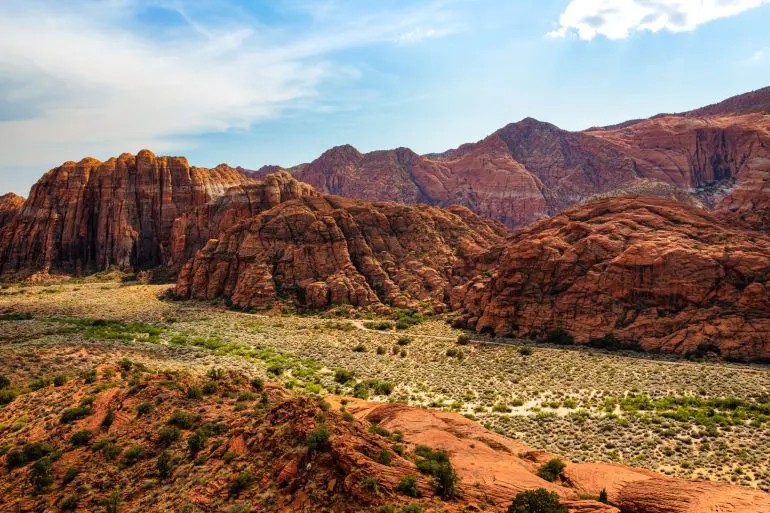From desert summits to alpine peaks, Utah’s mountains are a vital part of its geophysical story. Set in the very heart of the region known as the Intermountain West, it’s enclosed on all sides by six out of the seven other so-called “mountain states” and has roughly 80 ranges to its name. What’s more, while none of its peaks are “fourteeners,” being those that exceed 14,000 feet in elevation, Utah’s highest mountains certainly hold their own on a national scale. In fact, the average elevation of the highest of each of Utah’s counties’ peaks exceed by far those of all other US states. The question is, what are the highest mountains in Utah?
Climb aboard as we explore these heady heights, starting with the tallest of them all.
Kings Peak

Landscape views from Kings Peak, High Uintas Wilderness, Utah (Credit: Jeremy Christensen via Getty Images)
One of North America’s largest mountain systems makes an appearance in northeastern Utah. Here, a segment of the Rocky Mountains known as the Uinta Range is spread over a distance of around 100 miles. One aspect that marks this range out as extraordinary is its bearing, it being a rare example of major US mountain ranges with an east to west orientation. What’s more, this is the home of the ten highest mountains in Utah, with Kings Peak taking the top crown.
Located in the heart of the Uinta Mountains, roughly 80 miles east of Salt Lake City, Kings Peak reaches 13,528 feet above sea level. Protected within Ashley National Forest as well as the High Uintas Wilderness, it was named for Clarence King, the first director of the United States Geological Survey.
South Kings Peak

Rocky mountains, Utah (Credit: Mark Joseph / 500px via Getty Images)
Standing alongside Kings Peak and once thought to be the taller of the pair, this is the second highest mountain in Utah at 13,512 feet. But that’s only if it is to be counted as a mountain in its own right. This depends on the minimum prominence one considers necessary to count as an independent peak. The measure of 13,512 feet above refers to South Kings Peak’s elevation; the distance between the summit and sea level. By contrast, prominence is about how high it rises above its surroundings. With its prominence hovering somewhere around 400 feet, South Kings Peak falls below some minimums to count as a separate entity. Instead it might be classed as part of Kings Peak.
Gilbert Peak

High Uintas Wilderness, Utah. USA. (Credit: Scott Smith via Getty Images)
Still in the central Uinta Mountains, Gilbert Peak is third amongst Utah’s highest mountains, reaching 13,442 feet above sea level.
Mount Peale

Mount Peale in Utah (Credit: desertsolitaire via Getty Images)
In total, there are 17 peaks exceeding 13,000 feet in the Uinta Range, with various interpretations as to which count as mountains. No other range in Utah has mountains of this elevation. Beyond it, the next of the tallest mountains in Utah is Mount Peale at 12,721 feet. Located in the Manti-La Sal National Forest in the southeastern county of San Juan, it’s the tallest summit of the La Sal Mountains. Like the Uintas, these “Salt Mountains” form part of the southern Rockies, although they stretch for only 10 miles in the Colorado Plateau region. Densely forested and usually snowcapped, the mountain’s namesake, Albert Peale, was a mineralogist who took part in mapping the area.
Delano Peak

Delano Peak in the Tushar mountain range, Utah (Credit: harpazo_hope via Getty Images)
At 12,174 feet above sea level, Delano Peak is the highest summit of the Tushar Range. In terms of the biggest mountains of Utah, that would make the Tushars the third-highest range in the state. Set within Fishlake National Forest, it straddles the counties of Beaver and Piute. Its namesake, Columbus Delano, was secretary of the interior under President Ulysses S. Grant.
The Biggest Mountains of Utah

The Watchman and the Virgin River, Zion National Park, Utah (Credit: Justin Reznick Photography via Getty Images)
As we’ve seen, Utah’s varied landscapes are punctuated by an array of mountain ranges. Yet the highest mountains in Utah are clustered together within the Uinta Mountains, Kings Peak ruling over them all.











